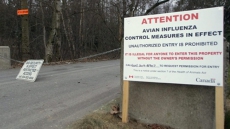TORONTO — It seems not all smokers are created equal when it comes to how their bodies handle nicotine, and that could have big implications for anyone trying to kick the tobacco habit for good, researchers say.
In a study published Monday in the journal Lancet Respiratory Medicine, researchers compared quit rates among tobacco users who were put on a nicotine-replacement patch compared to those given the smoking-cessation drug Champix (varenicline).
They based their research on how a smoker metabolizes, or breaks down, nicotine in the liver, using a biomarker called the nicotine metabolite ratio, or NMR. About 60 per cent of smokers are "normalized metabolizers," while the rest are "slow metabolizers."
"We've shown that it is possible to optimize quit rates for smokers, while minimizing side-effects, by selecting treatment based on whether people break down nicotine slowly or normally," said Rachel Tyndale, head of pharmacogenetics at the Centre for Addiction and Mental Health in Toronto, who co-led the Canadian-U.S. study.
Normal metabolizers tend to smoke more cigarettes per day and find it harder to butt out because nicotine is eliminated from their bodies much quicker, leading to a shorter duration between cravings for another tobacco rush, she said.
Their slower-metabolizing counterparts tend to maintain a steadier level of nicotine throughout the day and are less sensitive to smoking cues like seeing a cigarette pack, she said, often making it easier to quit.
The study involved 1,246 smokers — 584 normal metabolizers and 662 slow metabolizers — who had sought help to quit and were randomly assigned to receive either a placebo, the skin patch or the varenicline pill. All received behavioural counselling.
Researchers found that normal metabolizers were more than twice as likely to stay off smokes after 11 weeks of taking Champix compared to those on the patch, both by the end of treatment and after six months' followup. Almost 39 per cent taking the medication were still not smoking after treatment, compared to about 23 per cent of those on the patch.

"Varenicline works very well in normal metabolizers," she said. "It is a group that responds well to the drug, their side-effect profile is not particularly bad, and it's an effective drug for them," she said.
The prescription medication works by partially blocking nicotine receptors in brain cells, thereby reducing cravings and withdrawal symptoms. And if someone lapses and has a cigarette, they don't get the usual boost of feel-good chemicals like dopamine.
"It takes away a little bit of that urge to smoke and it takes away a little bit of their bang for the buck if they do happen to have a cigarette while they're on it," she said.
"The interesting thing is that in normal metabolizers, we actually see a decrease in irritability and a decrease in attentional disturbances, so we think this drug is still hitting those nicotinic receptors which have a lot to do with attention, which is why people feel distracted when they don't have nicotine (in) them."
However, the study found slow metabolizers benefited more from the patch, all things considered, despite similar quit rates — 28 per cent for the patch, 30 per cent for the pill.
"In the slow metabolizers, we see the patch and varenicline give pretty much the same kind of efficacy ... but varenicline costs a lot a more and more importantly, it caused more side-effects in this particular group," Tyndale explained. Slow metabolizers were more likely to experience nausea and disturbed sleep from abnormal dreams.
"We think that the way the nicotine kinetics changes the receptors in their brain means that they're much more sensitive to varenicline and it makes it a bit aversive for them."
Other potential side-effects include headache, drowsiness and altered taste. The drug also carries a "black-box" warning required by Health Canada and the U.S. FDA following a number of reports of depression, aggression and suicidal thoughts and suicide among some people taking varenicline for smoking cessation. In 2011, the regulators added a warning that the drug was linked to a higher risk of heart attack and stroke in people with cardiovascular disease.
"So that would be another reason you only give it to people who benefit from it," said Tyndale, who nevertheless contrasts the potential harms versus the benefits of the medication in helping people to stop smoking tobacco —which causes 37,000 deaths in Canada each year.
"Overall, you would essentially use a more expensive, more efficacious drug for the 60 per cent who are normal metabolizers, and for the low metabolizers, the patch, which has a very good safety profile and is pretty inexpensive relatively speaking."
Study co-lead Caryn Lerman, director of the Center for Interdisciplinary Research on Nicotine Addiction at the University of Pennsylvania, said a test using the NMR biomarker would be a valuable addition for doctors to help smokers get over their addiction.
"This is a much-needed, genetically informed biomarker that could be translated into clinical practice," Lerman said in a release. "Matching a treatment choice based on the rate at which smokers metabolize nicotine could be a viable strategy to help guide choices for smokers and ultimately improve quit rates."
In a commentary accompanying the study, Jennifer Ware, Neil Davies, and Marcus Munafo of the University of Bristol say the results represent an important scientific advance.
"Should the findings be replicated, they might lead to changes in clinical practice through the implementation of prescriptions stratified on the basis of a biomarker test," they write. "(However) the extent to which tailoring treatment by a biomarker such as NMR is a cost-effective approach will depend on doing a full health economic assessment ... which will also have to consider the effect of warnings stipulated by national regulatory bodies on prescribing rates of varenicline."
While no commercial NMR test exists outside research labs and hospitals, Tyndale said the U.S. National Institute on Drug Abuse has provided funding to companies to develop a doctors' test kit, which "we're hopeful will come along soon."





